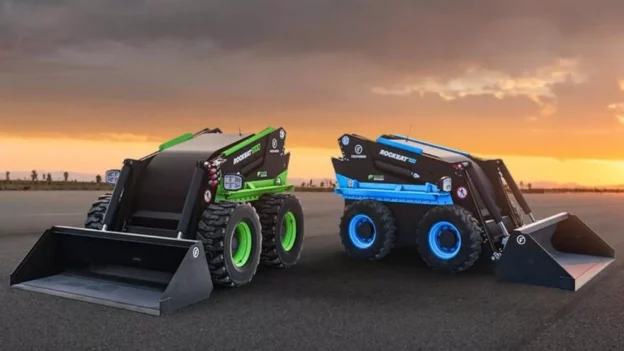FIRSTGREEN Industries has introduced a new range of remotely operated electric skid steers , designed to improve safety in mining, an industry that has seen a more than 30% increase in fatal accidents from 2022 to 2023.
These advanced equipment, which lacks a cabin, not only seek to protect workers, but also contribute to the environmental sustainability of the sector.
At the beginning of the year, the company presented the Elise CBL, the first electric loader without a cabin under the “Clean Construction Logistics” approach. This design allows for fully remote operations, significantly reducing the risk of injury and exposure to hazardous substances such as asbestos or radiation, typical in high-risk demolition work.
ROCKEAT series electric mini loaders
With the success of the Elise CBL, FIRSTGREEN has expanded this technology into the underground mining arena with its new ROCKEAT series . These devices allow tasks to be performed remotely, avoiding physical hazards and exposure to dangerous diesel emissions, which have known carcinogenic effects.
The ROCKEAT 700 and 1200 mini electric chargers , measuring 170 and 180 cm wide respectively, are available with lead acid or lithium-ion batteries. They can reach a power of up to 27 kW and a maximum torque of 3 x 120.7 Nm, with load capacities of 680 Kg and 1,500 Kg respectively.
They can be charged using standard 110v or 220v outlets, or through a quick battery swap system. What is notable is their ability to be operated remotely , either from a standard Danfoss remote cabin or through a FIRSTGREEN mobile application .
Safety and environmental sustainability
Marcus Suess, COO of FIRSTGREEN Industries, emphasized that these advances reinforce workplace safety and also support environmental sustainability in sectors with high levels of risks and pollution such as construction and mining. FIRSTGREEN’s commitment to innovation in machinery reflects how technology can be a fundamental pillar for the transformation towards safer and more environmentally friendly industrial practices.
It should be noted that the implementation of remote operation technology in heavy machinery, in addition to offering safety and environmental benefits, opens the door to greater operational efficiency and cost reduction. The ability to operate machinery from safe locations can decrease downtime due to accidents and increase productivity by enabling continuous operations in conditions that would traditionally require shutdowns.
Follow us on social networks and don’t miss any of our publications!
Inspenet.com YouTube LinkedIn Facebook Instagram X
Source and photo: ecoinventos.com

